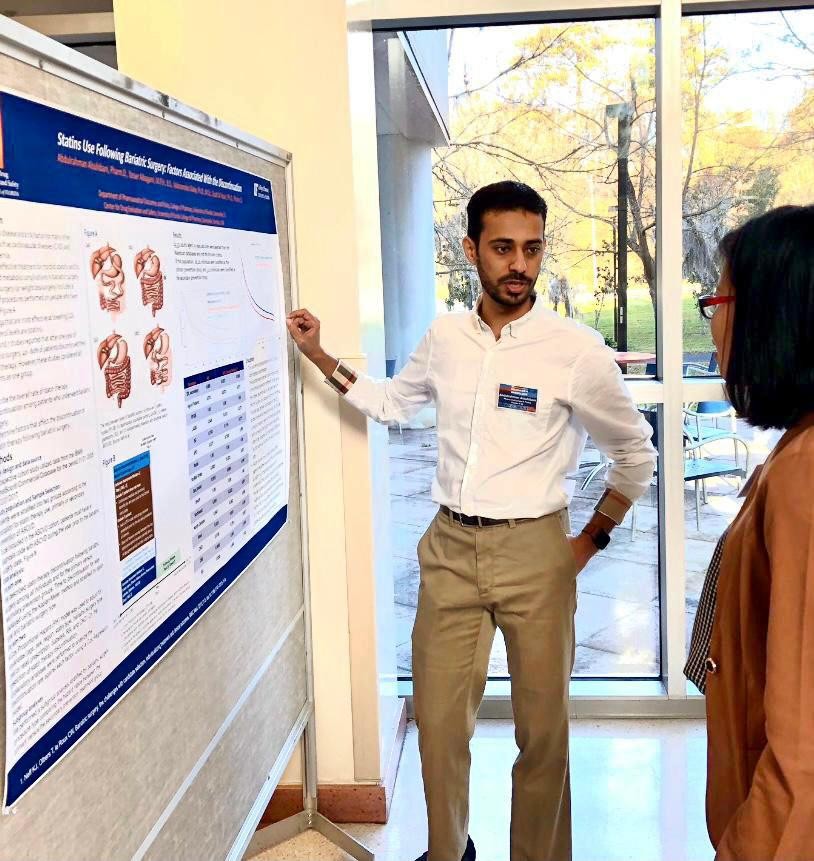
Coursework leads to published obesity research
UC doctoral pharmacy student authors two studies examining obesity medications
If you had the ability to cure a disease, what would it be?
That was the question Abdulrahman Alsuhibani asked himself when he began to study pharmacy in 2009. As he progressed in his studies — earning a doctoral degree in pharmacy from Qassim University, master’s degree in science from the University of Florida and now working toward a doctorate at the University of Cincinnati’s James L. Winkle College of Pharmacy — Alsuhibani narrowed his focus to research surrounding obesity.
“Think about a disease. Respiratory diseases, cardiovascular diseases, psychological diseases, liver and kidney disease, cancer, etc. Obesity is a significant risk factor for and contributor to increased morbidity and mortality from these diseases,” he said. “So preventing or curing obesity will help prevent a lot of medical conditions and health complications. This is why I’m interested in obesity.”
With his goal in mind, Alsuhibani is not waiting until he graduates to make an impact in the field. Taking what he has learned in the classroom, Alsuhibani has been the first author on two respective studies published this year.
Anti-obesity medication safety

UC College of Pharmacy doctoral student Abdulrahman Alsuhibani. Photo provided.
Part of obesity care is making sure treatments are safe for patients. Alsuhibani and his colleagues in the UC division of health outcomes recently published a study in the International Journal of Clinical Pharmacy analyzing the adverse events attributed to the use of anti-obesity medications.
The research team reviewed data from the Food and Drug Administration’s Adverse Event Reporting System database from 2013-20. Patients, physicians and other health care workers submit any suspected side effect from an anti-obesity medication to the system.
In the seven years analyzed, more than 18,000 unique adverse events were reported from more than 15,000 patients taking various anti-obesity medications. The study reported that 4.9% of the reported adverse events were deaths of patients, with 7.6% listed as life-threatening events, 35% requiring hospitalization and 5.9% described as disability cases.
Alsuhibani noted that while the overall fatality rate of 4.9% is considered high, this study does not show causality but rather informs where additional research and monitoring may be needed.
“It is necessary to continue and systematically monitor the safety of anti-obesity medications to optimize patient anti-obesity therapy,” he said. “Observational studies do not show causality; however, it shows the hypothesis of using real-world data to try to show some connections and association.”
Alsuhibani said a unique finding of the study is that deaths represented 4% of all adverse events attributed to orlistat, an over-the-counter anti-obesity medication. Since orlistat is the only anti-obesity drug available to the public without a prescription, he said there needs to be further investigations of the fatal cases potentially associated with using this medication.
[Alsuhibani] is a hardworking graduate student with an authentic scholar attitude. He did not want to just complete the coursework, but wanted to work on it carefully as a research project.
Jeff Guo, PhD
The most common adverse events reported among users of anti-obesity medications were nausea, vomiting, dizziness and headache. There were also 1,765 reports of cardiovascular disease, 1,327 reports of kidney complications and 194 reports of cancer.
The study began in light of the fact that several anti-obesity medications have been pulled from the market due to documented adverse events, including the withdrawal in February 2020 of the drug lorcaserin following reports that it may cause cancer.
Regarding lorcaserin, Alsuhibani said the study that led to its removal from the market had been questioned in the field due to many concerns, with the researchers not fully disclosing the information around the lorcaserin/cancers potential risk association. Alsuhibani’s study found that 16% of all reported adverse events attributed to lorcaserin use were reports of cancer.
Jeff Guo, PhD, UC professor of pharmacoepidemiology and pharmacoeconomics and a co-author of the paper, said the research began as an assignment in his pharmacoepidemiology and drug safety course. He credited Alsuhibani with taking his research seriously and thoroughly enough to get it published.
“He is a hardworking graduate student with an authentic scholar attitude,” Guo said. “He did not want to just complete the coursework, but wanted to work on it carefully as a research project.”

Alsuhibani presents his research regarding statins use following bariatric surgery. Photo provided.
Statin use following bariatric surgery
Alsuhibani and his colleagues also published a paper earlier this year in the journal Surgery for Obesity and Related Diseases examining the use of cholesterol-lowering drugs called statins following bariatric surgery.
According to guidelines, patients with no history of heart diseases can use statins in what is called a primary prevention use. Statins can also be prescribed for patients with a history of heart diseases, which is called a secondary prevention use.
Alsuhibani said medications used to treat hypertension and Type 2 diabetes are commonly discontinued following bariatric surgery, but this is not always the best course for patients taking statins. Continued use of statins following bariatric surgery may be necessary for some patients, particularly those using statins as a secondary prevention use against heart disease.
The study found that, at six months, 62% of patients in the primary and 53% in the secondary prevention treatment groups discontinued statin use.
Alsuhibani said this shows that 53% of patients may be inappropriately stopping the use of statins after surgery when they should be continuing them due to the ongoing risk of heart attack or stroke in the secondary prevention population. Future studies are needed to evaluate potentially inappropriate discontinuation of statin therapy, risks for subsequent heart disease events and the specific reasons why patients are discontinuing statin use following bariatric surgery, he said.
He is a bright grad student with a bright future. I am happy to collaborate with him.
Jeff Guo, PhD
Next steps
Alsuhibani said he chose the doctorate program at UC because of the College of Pharmacy's good reputation and resources.
"They have good data that could help me find an appropriate patient sample to test my hypotheses," he said.
With those resources available to him, Alsuhibani has begun work on his doctoral dissertation, which will examine the link between COVID-19 and obesity by examining the severity of COVID-19 between obese patients and patients who have had bariatric surgery.
Guo said he has enjoyed having Alsuhibani as a student and looks forward to his future work.
“He is a bright grad student with a bright future,” he said. “I am happy to collaborate with him.”
Featured photo at top of various medications courtesy of Unsplash.
You belong here
Whether you’re a first-generation student or from a family of Bearcats, UC is proud to support you at every step along your journey. We want to make sure you succeed — and feel right at home.
Related Stories
UC Law professors recognized for scholarly excellence
December 19, 2024
University of Cincinnati College of Law professors Stephanie McMahon and Andrew Mamo were recently recognized for their scholarly contributions.
ADAAPT: Growing Student Ideas
December 19, 2024
Steven Doehler, an industrial design professor at the University of Cincinnati’s College of Design, Architecture, Art, and Planning (DAAP), says he prioritizes the entrepreneurial aspect of a student's design product – which led him to create HomeGrown Studio.
UC study examines delivery timing in mothers with chronic...
December 19, 2024
In a study recently published in the journal O&G Open, University of Cincinnati College of Medicine physician researchers found 39 weeks of gestation is optimal for delivery in mothers with chronic hypertension.
